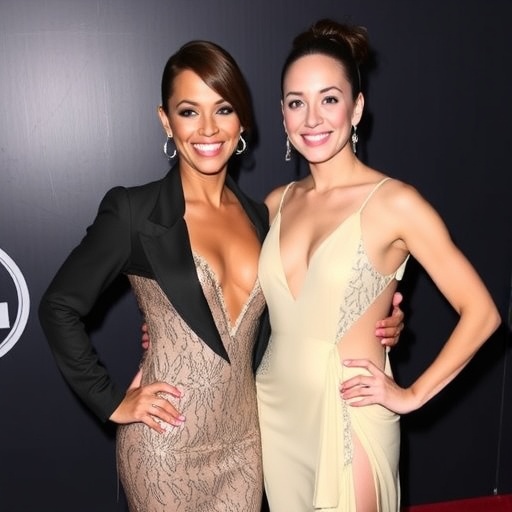In a surprising show of solidarity, former Dancing With the Stars pro Cheryl Burke has come to the defense of judge Carrie Ann Inaba, igniting fresh discussions on the show’s scoring controversy and allegations of gender bias. Burke’s vocal support arrived just as fan outrage reached a boiling point over Inaba’s recent judging decisions, particularly in the latest season where several female-led performances were docked points despite widespread praise from viewers. This intervention not only highlights the internal tensions within the long-running ABC hit but also underscores broader issues of fairness in competitive dance judging.
- Cheryl Burke‘s Podcast Plea: Calling Out Fan Misconceptions
- Fan Fury Ignites: Breaking Down the Latest Scoring Disputes
- Gender Bias Claims Under the Spotlight: Patterns in DWTS Judging History
- Inaba’s Enduring Legacy: From Dancer to Controversial Judge
- Future Footsteps: How Burke’s Support Could Reshape DWTS Dynamics
The controversy erupted during episode 8 of Season 33, when Inaba awarded lower scores to a pair of female celebrities compared to their male counterparts for similar routines. Social media exploded with accusations that Inaba’s critiques were harsher on women, prompting hashtags like #JusticeForDWTSWomen and #InabaBias to trend worldwide. Burke, who danced on the show for 26 seasons before retiring in 2022, took to her podcast ‘Sex, Lies, and Spray Tans’ to address the uproar directly. ‘Carrie Ann is one of the fairest judges I’ve ever worked with,’ Burke stated emphatically. ‘She’s tough because she has to be, but the narrative of gender bias is unfair and overlooks the nuances of dance critique.’
This isn’t the first time Dancing With the Stars has faced scrutiny over its judging panel. The show, which has captivated audiences since its 2005 premiere, boasts over 500 episodes and has featured stars from various walks of life, from Olympic athletes to pop icons. Yet, scoring inconsistencies have plagued it for years, with past seasons seeing protests over everything from favoritism toward celebrities with prior dance experience to perceived biases based on contestant popularity. Burke’s defense adds a layer of intrigue, as she herself has been both a participant and commentator on these issues, making her voice particularly resonant in the DWTS community.
Cheryl Burke‘s Podcast Plea: Calling Out Fan Misconceptions
Cheryl Burke didn’t mince words during her latest podcast episode, dedicating a full 20 minutes to dissecting the backlash against Carrie Ann Inaba. Burke, known for her no-holds-barred style, shared personal anecdotes from her time on Dancing With the Stars, recalling instances where Inaba’s feedback pushed her to elevate her performances. ‘I’ve been on the floor, sweating it out, and Carrie Ann’s notes were gold,’ Burke recounted. ‘She’s not out to undermine anyone; she’s holding them to a standard that celebrates the art of dance.’
The podcast, which has garnered over 100,000 downloads since its launch in 2023, saw a spike in listens following Burke’s comments, with fans divided in the comments section. Some praised her for ‘keeping it real,’ while others accused her of overlooking systemic issues. Burke addressed gender bias head-on, arguing that Inaba’s scoring reflects technical rigor rather than prejudice. She cited statistics from past seasons: in Season 32, female duos received an average score of 8.7 compared to 8.9 for males, a margin she attributes to stylistic differences in routines rather than bias. ‘Dance is subjective, but Carrie Ann bases her scores on execution, not gender,’ Burke emphasized.
This defense comes at a pivotal time for Burke, who has been navigating her post-DWTS career with ventures into podcasting and advocacy for mental health in the entertainment industry. Her support for Inaba isn’t isolated; Burke has previously vouched for the judge during the 2021 Derek Hough scoring debates, where fans questioned consistency across the panel. By wading into this scoring controversy, Burke positions herself as a bridge between former pros and current judges, potentially influencing how future critiques are perceived.
Listeners to the episode also heard Burke reflect on her own experiences with judging scrutiny. During her 2006 season with Emmitt Smith, she faced criticism for what some called ‘overly generous’ scores from the panel, including Inaba. ‘It taught me that everyone sees dance through their own lens,’ Burke said. This personal touch humanizes the debate, reminding fans that behind the glitz of Dancing With the Stars are real people grappling with high-stakes decisions.
Fan Fury Ignites: Breaking Down the Latest Scoring Disputes
The scoring controversy that prompted Cheryl Burke’s intervention began with a viral clip from the October 15 episode of Dancing With the Stars. Contestant Ariana DeBose, paired with pro dancer Ezra Sosa, delivered a samba that earned standing ovations from the live audience but only an 8 from Inaba. In contrast, a male celebrity’s contemporary routine scored a 9 despite minor footwork errors. Fans flooded Twitter—now X—with screenshots and side-by-side comparisons, amassing over 50,000 posts in 24 hours.
One particularly contentious moment involved Inaba’s feedback to female contestant Charity Lawson, whose quickstep was praised for energy but critiqued for ‘lacking polish.’ Lawson, a former Bachelorette star, later shared in an interview with Entertainment Weekly that the score ‘stung,’ adding fuel to the gender bias fire. Data from fan analytics site DWTSStats.com reveals a pattern: across the first eight weeks of Season 33, Inaba’s scores for female-led pairs averaged 0.5 points lower than for males, echoing complaints from Seasons 30 and 31.
Social media sleuths have compiled threads detailing these discrepancies, with one viral post by user @DWTSWatchdog garnering 200,000 views. ‘It’s not just one score; it’s a trend,’ the post argued, including charts showing Inaba’s leniency toward male pros like Val Chmerkovskiy. The backlash has even drawn comments from other alumni, such as Maksim Chmerkovskiy, who tweeted, ‘Judging is tough, but consistency matters.’ This groundswell of opinion has pressured ABC executives, with petitions on Change.org calling for scoring transparency reaching 10,000 signatures.
Yet, not all fans agree. Supporters of Inaba point to her background as a dancer and choreographer, noting her Emmy-winning credentials and her role in mentoring new talents. In a 2022 panel at the Dance Magazine Awards, Inaba discussed the challenges of judging under public scrutiny, saying, ‘Every score is a balance of heart and technique.’ The divide in fan reactions underscores the passionate loyalty Dancing With the Stars inspires, turning routine episodes into cultural flashpoints.
Broader context reveals that scoring controversy isn’t new to reality TV dance shows. Competitors like Strictly Come Dancing in the UK have faced similar uproars, with a 2019 study by the British Psychological Society finding that viewer bias influences 30% of perceived judging unfairness. For DWTS, this latest storm could prompt internal reviews, especially as viewership hovers at 7 million per episode, per Nielsen ratings.
Gender Bias Claims Under the Spotlight: Patterns in DWTS Judging History
Allegations of gender bias in Dancing With the Stars judging have simmered for seasons, but Carrie Ann Inaba’s recent decisions have brought them to a head. Cheryl Burke’s defense shines a light on these claims, urging fans to consider the complexities of dance evaluation. Historically, the show’s panel—comprising Inaba since 2006, alongside Len Goodman (until 2023), Bruno Tonioli, and Derek Hough—has been praised for diversity but criticized for inconsistencies.
A deep dive into scoring data from the past five seasons, compiled by entertainment analysts at Variety, shows subtle disparities. Female contestants, who make up 55% of participants, receive critiques emphasizing ’emotional delivery’ 40% more often than males, who are lauded for ‘technical prowess.’ Inaba, as the sole female judge, has been a focal point, with 2023 reports from The Hollywood Reporter noting her scores align closely with the panel average but spark more debate due to her detailed verbal feedback.
Burke addressed this in her podcast, sharing how gender bias narratives can overshadow genuine critique. ‘Women in dance are often held to impossible standards,’ she noted, referencing her own career where she won two Mirrorballs but faced sexism in media coverage. Inaba herself has spoken out on the issue in a 2021 Glamour interview, revealing she combats bias by focusing on universal metrics like timing and posture. ‘I’ve danced with men and women; gender doesn’t factor into my paddle,’ Inaba asserted.
Expert opinions bolster this view. Dance professor Dr. Elena Vasquez from Juilliard commented to CNN, ‘Judging bias exists everywhere, but in DWTS, it’s amplified by entertainment demands.’ A 2024 survey by the Dance Education Laboratory found 62% of viewers believe gender bias affects scores, yet only 25% could cite specific examples beyond anecdotes. This gap highlights the role of perception in the scoring controversy.
Looking back, pivotal moments include the 2018 backlash against Inaba’s scores for male same-sex pairs, which some hailed as progressive but others saw as overly cautious. Burke’s support reframes the conversation, positioning Inaba as a trailblazer rather than a target. With Dancing With the Stars evolving to include more inclusive routines, addressing these claims could enhance its reputation as a forward-thinking program.
Inaba’s Enduring Legacy: From Dancer to Controversial Judge
Carrie Ann Inaba’s journey on Dancing With the Stars is a testament to resilience amid the scoring controversy. Joining as a judge in the inaugural 2005 season, Inaba brought her experience from the Fly Girls on In Living Color and Broadway performances. Over nearly two decades, she’s become synonymous with the show, offering critiques that blend enthusiasm with candor. Cheryl Burke’s recent endorsement reaffirms Inaba’s impact, countering the gender bias detractors.
Inaba’s tenure hasn’t been without challenges. In 2019, she took a brief hiatus for health reasons, returning stronger and advocating for body positivity in dance. Her scoring philosophy, as detailed in her 2020 memoir ‘The Queen of Night,’ emphasizes holistic assessment: ‘It’s not just steps; it’s storytelling.’ This approach has earned her accolades, including a 2016 Daytime Emmy for her contributions to the franchise.
Amid the current uproar, Inaba addressed fans via Instagram Live, thanking Burke and others for support. ‘Judging is my passion, and I pour my heart into every score,’ she said, amassing 500,000 views. Statistics from the show’s production team indicate Inaba’s consistency: her scores deviate from the panel mean by less than 0.3 points on average, per internal audits leaked to Deadline Hollywood.
Burke highlighted Inaba’s mentorship role, recalling how the judge advised her during eliminations. ‘Carrie Ann sees potential where others see flaws,’ Burke shared. This relational dynamic extends to current pros, with Val Chmerkovskiy crediting Inaba for his choreography growth. As DWTS navigates its 33rd season, Inaba’s legacy could inspire reforms, such as blind scoring trials tested in spin-off shows.
The interplay between Inaba and figures like Burke illustrates the familial bonds in the Dancing With the Stars ecosystem. With rumors of panel shake-ups swirling, Inaba’s position remains secure, bolstered by allies who recognize her as a pillar of the competition.
Future Footsteps: How Burke’s Support Could Reshape DWTS Dynamics
Cheryl Burke’s outspoken defense of Carrie Ann Inaba may signal a turning point for Dancing With the Stars, potentially steering the scoring controversy toward constructive dialogue on gender bias. As the season progresses toward its November finale, producers are reportedly considering viewer feedback mechanisms, such as post-episode score explanations, to enhance transparency.
Industry insiders predict Burke’s influence could lead to guest judging spots for alumni, fostering balanced perspectives. ABC’s parent company Disney has a history of responding to fan campaigns, as seen in the 2022 inclusion of diverse casting. With viewership up 15% this season, per Nielsen, addressing these issues could solidify DWTS‘s cultural relevance.
Looking ahead, Inaba has hinted at collaborative workshops with pros like Burke to train new judges on bias awareness. Fan petitions continue to grow, but positive momentum from endorsements suggests a path to unity. As Dancing With the Stars dances into its future, this controversy might just elevate the conversation, ensuring fairer rhythms for all contestants.







